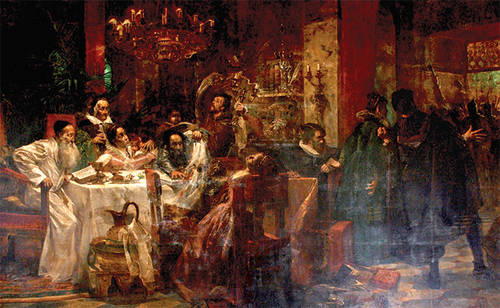Isaac Abravanel and the Sephardic Post-Expulsion Diaspora
12/28/2018 07:45:16 AM
Dr. Mariana Montiel
| Author | |
| Date Added | |
| Automatically create summary | |
| Summary |
Isaac Abravanel was born in Lisbon, Portugal in 1437. His ancestors came from a renowned Jewish Spanish family from Seville, forced to emigrate to Portugal after the pogroms of 1391. His grandfather, Samuel Abravanel, had been treasurer to the Castilian kings Henry II and John I.
Isaac Abravanel was a prolific Jewish Scholar and rabbi. One of his major works, his commentary on the Prophets, compares the monarchies described in the first book of Samuel to the monarchies of his day, in the 15th century.
Isaac Abravanel received a traditional Hebrew religious education, enhanced with an emphasis on the arts and sciences. This secular aspect of his studies allowed him to eventually become familiar with certain ideas of the Renaissance writers and contrast them with the Jewish tradition.
Trade and commerce were family activities, and the liberal and cultural environment of his childhood and adolescence influenced his future endeavors, both intellectual and practical. His father, Judah, was treasurer to the Portuguese king Alfonso V.
When his father died, Abravanel inherited the position of Treasurer of the Court. However, with the passing of Alfonso V in 1481 his successor, John II, accused Isaac of conspiring against the King, accusation which he always denied, proclaiming his innocence and loyalty. However, he was forced to escape to Castille, to Spain, and was sentenced to death in absentia.
Once convinced of having wasted his time serving the Court, Abravanel decided to dedicate the rest of his life to religious studies. In a short time, he elaborated comments on the books of Joshua, Judges and Samuel. However, in 1484 King Ferdinand of Spain invited him to be the collector of royal revenues, even though it was illegal for a Jew to hold such a high position. Abravanel accepted this offer as, on the one hand, he had expertise in finance and, on the other, he felt that this position could prove to be of use in protecting the Jews from the recently installed Inquisition.
At the end, Isaac Abravanel is best known for his brilliance as a financier and as a diplomat. He became, in a period of eight years, a proven commercial and financial agent of the Catholic kings Ferdinand and Isabella, and even lent them important amounts of money to finance the Granada War, Granada being the last bastion of the Muslim invasion of Spain. Isaac Abravanel became partner to Abraham Senior, another rabbi and financier, and they developed a close friendship and successful business relation. Together they advocated for and financed Christopher Columbus´s transatlantic expedition.
Nevertheless, on the contrary of Senior, Isaac Abravanel refused to convert when the Catholic Kings proclaimed the expulsion of the Jews from Spain, which both of them had tried to avoid, using their influences. Forced to leave Spain, Abravanel saw himself transformed as a sort of Moses for the Jews in their departure. He was required immediately by King Ferrante of Naples, and remained in the service of his successor, Alfonso II. When Naples was invaded by Carl VIII of France in 1495 Abravanel accompanied King Alfonso II in his exile in Sicily and Corfu. In 1503 he settled in Venice and participated in the negotiations between the Venetian senate and Portugal to establish a commercial treaty regulating the interchange of spices. He continued elaborating commentaries and exegesis until his death in Venice in 1508.
According to a letter from the painter Leonid Pasternak, father of Boris Pasternak (author of Dr. Zhivago) to the poet Hayim Naiman Bialik, the Pasternak descended from Isaac Abravanel.
Isaac Abravanel, in his Edict Response, written to Ferdinand and Isabella before leaving Spain, wrote the following:
In your heart of hearts, you distrust the power of knowledge, and you respect only power. With us Jews it is different. We Jews cherish knowledge immensely. In our homes and in our prayer houses, learning is a lifelong pursuit. Learning is our lifelong passion; it is at the core of our being; it is the reason, according to our sages, for which we were created. Our fierce love of learning could have counterbalanced your excessive love of might. We could have benefited from the protection offered by your royal arms, and you could have profited the more from our community's advancement and exchange of knowledge. I say to you we could have helped each other.
In our section on the Sephardic post-expulsion diaspora we will comment the presence of Sephardim in a predominantly Ashkenazi region, the Russian Empire. As we saw, the Pasternak family trace their origin to Isaac Abravanel! Indeed, the records indicate that the second wave of the Sephardic diaspora brought these Jews to the northeastern reaches of Europe. Although some of the places mentioned are located within the contemporary borders of Lithuania and Latvia, they were part of Russia prior to those nations’ declarations of independence in 1918.
It is documented that Sephardim had already arrived in the Baltics just five decades after the expulsions from Spain and Portugal.* The Jews living in the city of Vilkaviškis in southwestern Lithuania established a synagogue in 1545 whose Holy Ark held Torah scrolls that some congregants had brought with them from Spain.
Several generic family names are known to indicate ancestry from Spain and Portugal. The Sephardic surname Abohab was transformed into Abugov and Abuhov in Ashkenazic communities. Alexander Abugov was born in 1888 in the city of Šiauliai in northern Lithuania and Movsha Shliomo Abugov and his wife, Khaia Ita, registered their children, Gdalia and Samuil Abugov, in Vilnius in 1908 and 1912 respectively, although the family was originally from Mahilyow, Belarus.
A branch of the Sephardic Algazi family lived in Prienai, a city in southern Lithuania. Szolom Algazy was a rabbi in Prienai in the middle of the 19th century and one of his sons, Eliezer Yitzkhak Algazy, served as a rabbi in Balbieriškis. Other members of the Algazi family were rabbis in Mediterranean region cities like İzmir, Istanbul, and Jerusalem. A famous descendant of the Algazys of Prienai is the American actor Robert Downey, Jr. (Iron Man)!
Delion, also spelled Dylion, was the Eastern European Jewish version of the Sephardic surname de León. Some families in Eastern Europe didn’t preserve their original Sephardic surnames, or the surnames were lost through their daughter´s marriage, and some families didn’t remember that they had Sephardic ancestors and have no documentation about it either.
Some Jews with the surname Maimon resided in Lithuania. Moshe Maimon, who lived between 1860 y 1924 was a Jewish- Russian painter born in present day Lithuania. He actually was one of the first  Jewish-Russian artists to achieve international fame, and was the grandson of the author Alexander Ziskind Maimon. His painting Marranos: Secret Seder, is a daunting masterpiece that gives testimony to the risks that the Spanish Jews were willing to assume in order to maintain their Faith. Indeed, many of the Sephardim in Russia, Ukraine, and Eastern Europe in general left Spain and Portugal in the XVI and XVII centuries, when their situation as Conversos became unsustainable. As an anecdote, it was thought that The Secret Seder painting had been lost, and its discovery includes a detective-like adventure. Now it is on exhibit in the Hebrew Home for the Aged in New York.
Jewish-Russian artists to achieve international fame, and was the grandson of the author Alexander Ziskind Maimon. His painting Marranos: Secret Seder, is a daunting masterpiece that gives testimony to the risks that the Spanish Jews were willing to assume in order to maintain their Faith. Indeed, many of the Sephardim in Russia, Ukraine, and Eastern Europe in general left Spain and Portugal in the XVI and XVII centuries, when their situation as Conversos became unsustainable. As an anecdote, it was thought that The Secret Seder painting had been lost, and its discovery includes a detective-like adventure. Now it is on exhibit in the Hebrew Home for the Aged in New York.
REFERENCE:
*The information about Lithuanian and Latvian Jews is cited from the article Sephardic Jews in Lithuania and Latvia by Kevin Alan Brook, The Journal of the San Francisco Bay Area Volume XXXVI, number 3.
Tue, April 1 2025
3 Nisan 5785
Building Blocks Sunday School
Prayer Services
Coming Soon at OVS
-
Saturday ,
AprApril 12 , 2025Shabbat Together
Shabbat, Apr 12th 10:30a to 11:30a
Join us for our new Kavanagh Minyan & Children's Services the second Saturday each month. Following these services, we'll join the group in the Sanctuary for Rabbi Hearshen's sermon followed by Kiddush lunch. It’s as easy as: Inviting your friends and family for Shabbat Dinner, Taking a few photos, Sharing the photos with OVS & One Table And... Receiving a stipend for each person at your dinner. -
Tuesday ,
AprApril 15 , 2025Passover Picnic & a Walk in the Park
Tuesday, Apr 15th 11:30a to 1:00p
Bring your own picnic lunch and catch up your OVS friends. Join us for a walk along the boardwalk after we eat. Exact location will be emailed prior to the picnic. Free of charge. -
Thursday ,
MayMay 1 , 2025Sephardic Dinner to Go
Thursday, May 1st 2:00p to 4:00p
Dinner To Go includes 1 dozen burekas (potato, spinach or rice, while supplies last), 1 quart Avas (tomato based white bean soup), 1 quart rice, tossed garden salad and 6 biscochos. Pre-orders only by Monday, April 28. -
Sunday ,
AugAugust 17 , 2025Building Blocks Sunday School 2025-2026
Sunday, Aug 17th 9:00a to 12:00p
Building Blocks Sunday School at Congregation Or VeShalom is for children ages 2 - 12. Areas of focus include prayer, Jewish holidays, Jewish values, modern Hebrew, Hebrew reading, Israel, and Sephardic Jewish culture.
Burekas & Biscochos
The Sephardic Cooks
My Preferences for Contact
Today's Calendar
| Bureka Making : 9:30am |
This week's Torah portion is Parshat Vayikra
| Shabbat, Apr 5 |
Candle Lighting
| Friday, Apr 4, 7:42pm |
Havdalah
| Motzei Shabbat, Apr 5, 8:36pm |
Taanit Bechorot
| Thursday, Apr 10 |
OVS Feature Video
Congregation Or VeShalom
404-633-1737 | office@orveshalom.org
1681 N Druid Hills Road | Brookhaven, GA 30319
Privacy Settings | Privacy Policy | Member Terms
©2025 All rights reserved. Find out more about ShulCloud


